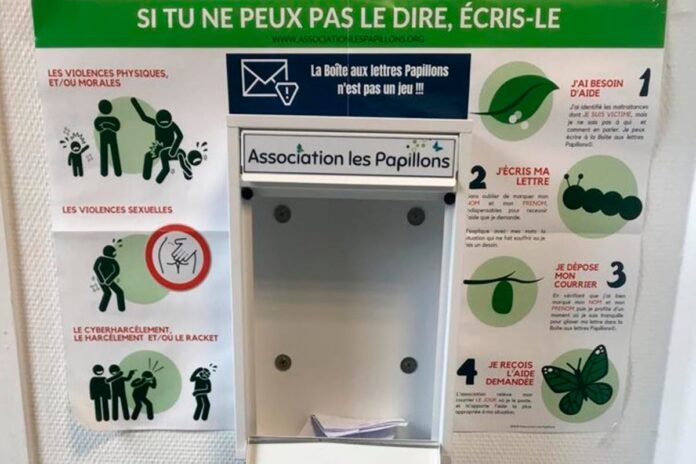A new campaign in France allows young children to flag abusive attacks by simply dropping letters in easily accessible mailboxes across the country, for experts to assess. And the results have led to several police investigations, while giving a rare and shocking snapshot of the scale of child abuse in France.Started by a police officer who was himself sexually abused as a boy and founded a child protection group called Les Papillons (‘Butterflies’), the two-year-old program runs under the motto: ‘If you can’t say it, write it.’Most of the written messages deposited over the past year in the 200 white boxes set up in primary schools, sports clubs and other places accessible to some 61,000 children, refer to insults, mockery, and psychological aggression.But 13% concerns school bullying, 21% physical abuse, and 7% sexual abuse. In the latter group, 30% occurred within the family circle and 70% concerned girls. ‘It’s useful for some children who cannot get to speak out loud of painful things, or who don’t know whom to talk to,’ said Florence, the principal of a school for 3- to 10-year-olds in a rural area of eastern France.’It’s very difficult to speak about sexual abuse, especially if that’s about someone in or close to the family – whereas the mailbox is neutral,’ she stressed. She asked The Associated Press not to use her full name, to protect the privacy of the children involved.About half the complaints are from children aged 8-9, and over 15% are aged 6-7, given that the majority of mailboxes are placed in primary schools and most young kids don’t have a mobile phone to call the 119 official helpline for abused children.Police officer Laurent Boyet, head of Les Papillons, said the initiative helps home in on an issue that is difficult to detect in official statistics.In projections based on the past year’s responses, the group calculated that out of the country’s 12 million preschool to high school students there could be an estimated 840,000 victims of sexual abuse, including 240,000 cases of incest.’The great strength of (the) process is that it’s based on the children’s words … There’s no adult interfering,’ Boyet stressed. Boyet wrote a book in 2017 to tell his own story. He said he was raped by his brother, who was 10 years older, when he was between the ages of 6 and 9.’I know from having been a victim myself: the aggressor forbids (children) to speak … But no one tells you that you cannot write,’ he said. ‘And writing, you can do it quietly in your bedroom.’Each time a mailbox is installed, Boyet said, explanations are provided to children about the project. A person of trust is designated to pick up the letters at least twice a week. Messages are then assessed by a team of 12 volunteers, all professionals in the field of children’s issues, including psychologists and educators.About 5% of the cases have been reported to the local authorities’ child maltreatment units in charge of taking necessary measures.And 1.6% of the messages have been immediately reported to prosecutors, leading to a police investigation, in line with French law regarding ‘serious and imminent danger’ to children. They include all alleged sexual abuses.It happened in the school where Florence is the principal after a mailbox was set up there when she heard about the initiative from one of the association’s volunteers.’It seemed interesting,’ she said. ‘I thought there were not many issues in my school so, at the beginning, it was more to clear my conscience. I thought that it wouldn’t hurt. As it turns out, there were some needs.’ Florence.In June, on the very first day the mailbox was set up, a 10-year-old girl left a message naming her grandfather, and describing what appeared to have been instances of incestuous rape. A few days later, police officers confirmed that she and two other girls in her family had allegedly been victims of incest for years.This was a ‘tragic’ situation, Florence recalled. ‘In the end, the parents thanked us because it helped their daughter to escape a sexual predator.’ The suspected aggressor is now in prison pending trial.Boyet stressed that almost all children take the mailboxes seriously and that malicious or made-up accusations are ‘extremely rare.’ Only 2% of the messages in the mailboxes are anonymous and almost none are irrelevant, he added.Before the 2000s, France did not have specific national surveys on interpersonal violence. And it was not until 2015 that a large survey provided a better understanding of violence during childhood. Carried out by the French Institute of Demographic Studies, Ined, it provided estimates of sexual abuse under the age of 18, based on a sample of nearly 27,000 adult women and men. It showed that 4% of women and O,4% of men said they experienced unwanted sexual touching, while rapes and rape attempts have been reported by 1,5% of women and 0.3% of men.Boyet said he was not surprised by the figures resulting from the Papillons initiative showing the extent of child abuse. ‘It strengthened my conviction in the sense that figures we usually use, we know they are under-estimated,’ he said. ‘That’s what gives meaning to the work we are doing.’


